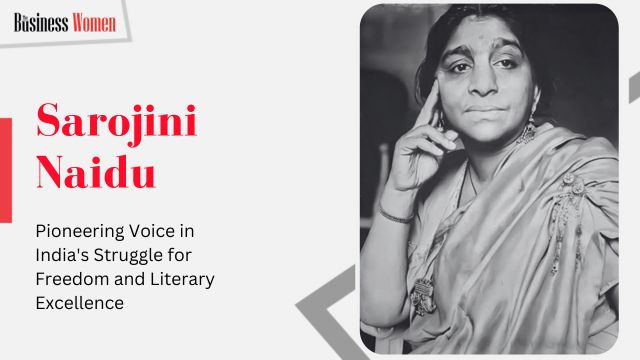Sarojini Naidu: Pioneering Voice in India’s Struggle for Freedom and Literary Excellence
Sarojini Naidu, famously dubbed the “Nightingale of India,” stands as a towering figure in both India’s independence movement and its literary landscape. Her multifaceted contributions span politics, literature, and feminism, leaving an indelible mark on the nation’s history.
Early Years and Academic Pursuits
Born into a scholarly Bengali family on February 13, 1879, in Hyderabad, Naidu was immersed in a culture of learning from a young age. Her father’s role as the principal of Nizam College and her mother’s talent as a poet nurtured her intellectual curiosity and love for literature. Naidu’s academic prowess shone early on, as she achieved exceptional success in her studies, culminating in her pursuit of higher education in England at King’s College, London, and Girton College, Cambridge.
Marriage and Unconventional Choices
In 1898, Naidu broke societal norms by marrying Govindaraju Naidu, a physician, in a marriage characterised by harmony and mutual respect. Together, they raised five children, including Padmaja Naidu, who followed in her mother’s footsteps as a prominent figure in India’s freedom struggle.
Political Engagement and Advocacy
Her fervent advocacy marked Naidu’s entry into politics for women’s rights and Indian independence. Her eloquence and persuasive oratory skills, employing the Nyaya rhetorical structure, garnered widespread recognition and respect. Notably, she returned the Kaisar-i-Hind Medal in protest against the Jallianwala Bagh massacre, underscoring her unwavering commitment to justice.
Collaboration with Mahatma Gandhi and International Engagement
A staunch ally of Mahatma Gandhi, Naidu played a pivotal role in the Women’s Indian Association and represented the Indian National Congress on international platforms, including the East African Indian National Congress. In 1925, she made history as the first Indian woman to preside over the Indian National Congress, further solidifying her status as a trailblazer in Indian politics.
Imprisonment and Leadership Role
During the Quit India Movement in 1942, Naidu was imprisoned for her dedication to nonviolent resistance and India’s freedom. Following India’s independence in 1947, she assumed the prestigious position of the first female Governor of the United Provinces, exemplifying her trailblazing spirit and leadership.
Literary Legacy
Naidu’s literary contributions mirrored her political activism, blending British Romanticism with Indian nationalism. Her poetry collections, including “The Golden Threshold,” “The Bird of Time,” and “The Broken Wing,” captured the essence of India’s struggle for freedom and garnered widespread acclaim. Even posthumously, her unpublished works, curated by her daughter Padmaja Naidu, continued to inspire readers in “The Feather of the Dawn.”
Death and Enduring Influence
Sarojini Naidu passed away on March 2, 1949, leaving behind a legacy that transcends generations. Celebrated annually on February 13 as Women’s Day, her birthday serves as a reminder of her enduring impact on feminism and activism. Her life epitomises dedication, sacrifice, and achievement, inspiring countless individuals to strive for a better world through literature and social change. Sarojini Naidu remains an icon of perseverance, intellect, and unwavering commitment to justice in India’s history and beyond.

